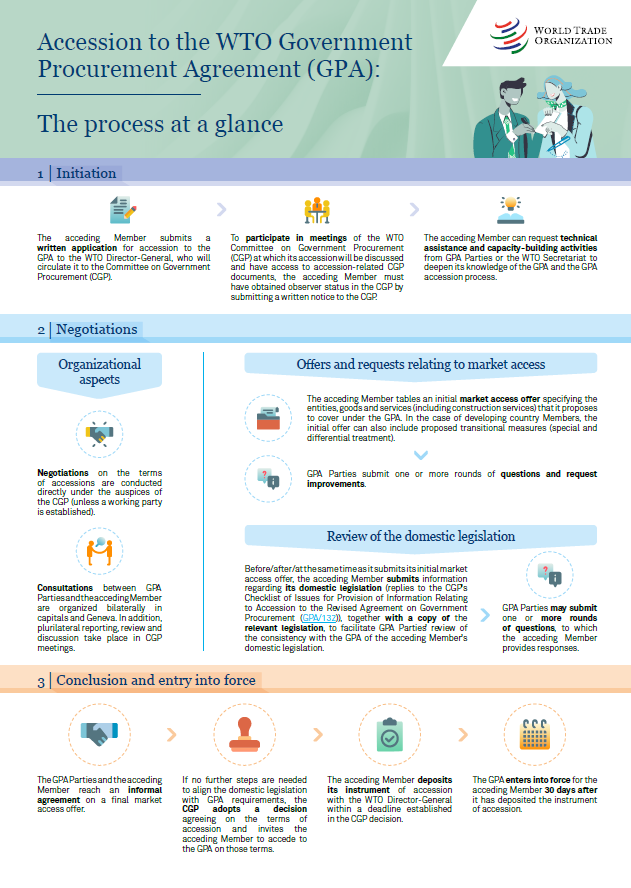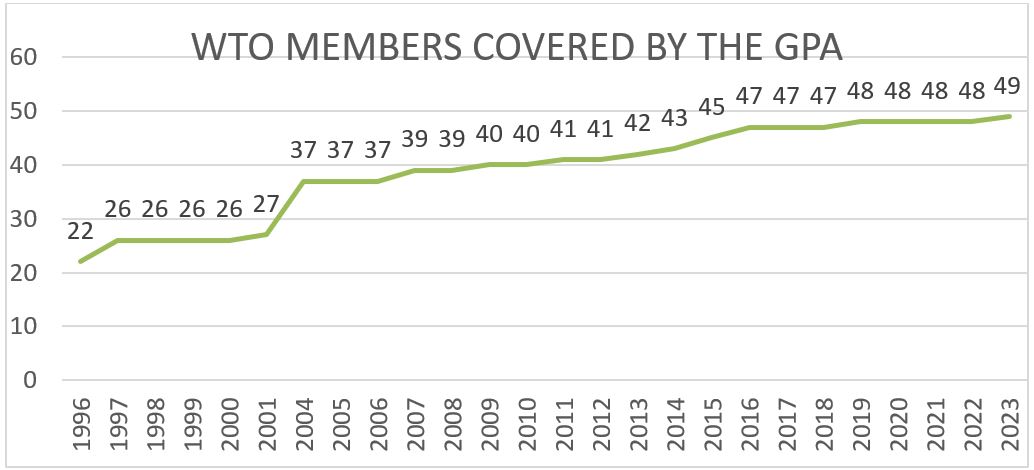AGREEMENT ON GOVERNMENT PROCUREMENT
Accession to the GPA 2012
All WTO members are eligible to accede to the GPA 2012 (Article XXII:2). Several WTO members have initiated accession negotiations. Other WTO members have undertaken commitments, in their WTO accession protocols, to initiate accession to the GPA 2012.
Pending GPA accession negotiations
While all accession negotiations identified below have been initiated, they are not all being actively pursued at present.
| Member | Application for GPA accession |
Albania |
2 October 2001 |
Brazil |
19 May 2020 |
China |
14 January 2008 |
Costa Rica |
27 September 2023 |
Georgia |
17 October 2002 |
Jordan |
19 July 2000 |
Kazakhstan |
2 December 2019 |
Kyrgyz Republic |
19 May 1999 |
Oman |
3 May 2001 |
The Russian Federation |
22 August 2016 |
Tajikistan |
12 February 2015 |
GPA accession commitments of WTO members that have not yet applied for accession to the GPA 2012
Member |
GPA Accession Commitments |
Afghanistan |
Date of WTO accession: 29 July 2016 WT/ACC/AFG/36, para. 199: |
Mongolia |
Date of WTO accession: 29 January 1997 WT/ACC/MNG/9, para. 59. |
Saudi Arabia |
Date of WTO accession: 11 December 2005 WT/ACC/SAU/61, para. 231. |
Seychelles |
Date of WTO accession: 26 April 2015 WT/ACC/SYC/64, para. 322. |
Accession process
The accession process starts with the submission of an application for accession and has two main aspects.
First, the accession process serves to ensure that the acceding member's procurement legislation is consistent with the requirements of the GPA 2012 — for example, regarding transparency, procedural fairness for suppliers and domestic review.
Second, it involves negotiations between the acceding member and GPA parties on the former's GPA coverage (market access commitments). The coverage negotiations determine the procuring entities and goods and services sectors of the acceding member's public procurement market that the acceding member wishes to open to international competition.
GPA coverage offer
An acceding member's GPA coverage offer identifies its proposed coverage with respect to four areas:
- its procuring entities to be covered under the Agreement
- the goods, services and construction services to be covered under the Agreement
- its threshold values above which procurement activities are to be covered by the Agreement and
- exceptions to the proposed coverage.
The disciplines of the GPA 2012 only apply to the entities, goods and services sectors and contract values (above certain financial thresholds) specified in a GPA party's appendix to the GPA 2012.
Flexibilities for developing countries
The GPA 2012 provides important flexibilities for developing country parties to manage their transition to a more internationally competitive government procurement regime. Pursuant to Article V of the GPA 2012, special and differential treatment for developing countries in the form of transitional measures such as offsets, price preference programmes, initially higher thresholds and phasing-in of entities, can be negotiated by a developing acceding country in the accession process, subject to the agreement of the GPA parties and the acceding member's development needs.
Terms of accession
Once the terms of accession have been agreed between the GPA parties and the acceding WTO member, the Committee adopts a decision inviting the member to accede to the Agreement. The decision specifies the agreed terms and provides a timeframe for the acceding member to deposit its instrument of accession with the WTO Director-General (typically three to six months).
A one-page overview of the entire accession process can be accessed here.
Documents relating to accessions
For a comprehensive compilation of documents relating to accessions, please refer to the Note by the Secretariat entitled “Systematic Compilation of Documents Concerning Individual GPA Accession Processes”, which is updated periodically to reflect the latest documents (GPA/S/1).
Technical assistance
The WTO Secretariat provides technical assistance to assist developing country WTO members interested in learning more about the GPA 2012 and/or acceding to the GPA 2012. Where appropriate and desired by accession candidates, other intergovernmental organizations (e.g. regional development banks) or governance-focused institutes may also provide technical assistance with regard to GPA accession.
Benefits of accession
Accession to the GPA 2012 provides important benefits for governments that are parties to the GPA 2012, their covered procuring entities, suppliers and citizens. These include:
- potential trade gains (export earnings) based on legally assured access to the covered foreign procurement markets
- ensuring a transparent, competitive and predictable domestic government procurement system
- contributing to good governance in the domestic government procurement system
- keeping domestic markets open in times of crisis where the temptation for protectionism rises
- in the context of acceding candidates, the GPA 2012 can help to reform their government procurement system in line with international best practices, and lock in the benefits of such reforms
- improved public, supplier and investor confidence in the government procurement system, potentially stimulating inbound foreign direct investment
- enhanced competition for public contracts, leading to improved value for money outcomes in the domestic government procurement system
- facilitating a more effective and efficient use of public resources.
The GPA 2012 provides a useful tool for optimizing value for money and good governance and trade objectives in the government procurement sector. Participation in the GPA 2012 also affords the opportunity to influence the future evolution of the Agreement.
Share
Problems viewing this page? If so, please contact [email protected] giving details of the operating system and web browser you are using.

